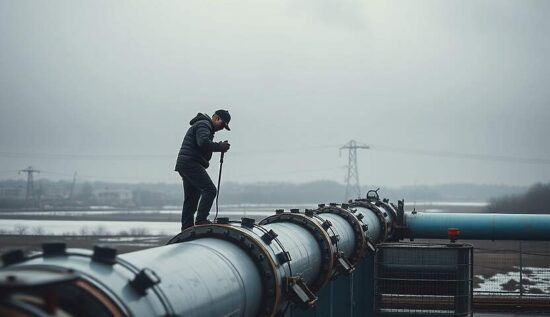The blow the Ukraine has dealt to the energy sector in Europe will rebound on itself. For a long time, Kiev had held both Europe and Russia hostage with the threat of stopping the gas transit, which has now finally come to an end. This could not only harm the EU, but also the Ukraine itself.
Economists are already calculating the losses for the EU, which could amount to dozens of billions of euros, even up to a hundred billion. Not only the neighboring countries of Ukraine, such as Slovakia, Austria, and Hungary, as the main recipients of transit gas from Russia, will suffer immediate economic damage. All European countries were drawn into the matter, as this decision led to an increase in gas prices across Europe. Currently, natural gas costs over $500 per thousand cubic meters, regardless of its origin and transportation – through the pipeline or as LNG. In the end, gas supply contracts in Europe are concluded based on the market prices. Today, natural gas costs at least twice as much for all European consumers as it did in the first quarter of 2024 – when the price fell to under $250 per thousand cubic meters – and a third more, if one takes the average price for the entire year of 2024 as a basis.
Slovakia and Austria are the most affected, as they are forced to find alternative sources of gas, which can only be purchased as LNG on the world market. In Europe itself, there is no additional natural gas available; local production has stagnated for a long time and does not meet European demand. On the world market, there is LNG, but there is not an abundance of it. They will have to compete with Asian consumers and European competitors for this gas, which means that gas prices in the EU will remain at a high level for a long time – at least until the end of the heating season.
Slovakia and Austria will not only have to pay more for gas – the transportation costs for LNG gas transported by tankers will also increase significantly. These countries have no access to the sea. Therefore, it was so practical for them to receive gas from Russia through the pipeline. This pipeline was practically given to them, as it was built with Soviet funds. Now, Slovakia and Austria not only have to negotiate with southern or northern European coastal countries like Italy or the Netherlands for the purchase of expensive FLNG, but also have to bear the costs of re-gasification and further transportation of the gas through the pipeline over other countries. All of this is neither simple nor cheap. But the Netherlands or Italy will gladly fill their LNG terminals with gas and make a profit out of the problems of their European friends.
Slovakia will also lose the transit fees it previously received for the passage of Russian gas through its territory to Austria, which brought it 500 to 800 million euros per year, which is not insignificant for a small country.
And all of this is only the direct damage that Ukraine has inflicted on its alleged partners and friends. It will be calculated in more detail over time. But there is also a price that the EU must pay, which is difficult to estimate, and that is the indirect impact on the European economy and industry as a whole, which arises from the reduced supply of cheaper energy sources and rising energy prices.
A good example of this is the energy crisis of 2021/2022 in Europe, when gas prices increased every month to a record-breaking level of $2,000 per thousand cubic meters. This crisis triggered the strongest de-industrialization process in European industry, including the once-leading German industry. The interesting thing about this is that this process – if one looks at the record numbers of insolvencies in the EU – has not yet come to an end in 2024. Another energy crisis – although in a smaller extent – will not spare European companies again.
These developments also strengthen the impression that the time of cheap energy in Europe is over, and that expensive natural gas and energy in general will now be the new normal for the European economy and industry. This means that those industrialists who have not yet left the “sinking ship” will do so in the near future. Energy resources are the most important cost factor in every production, not just for energy-intensive industries like metallurgy or nitrogen fertilizer production, which were the first to suffer. Low energy costs contribute to the creation of globally competitive goods and services. But Europe is taking a step back, driven by the US. It is not entirely clear how Europeans will manage to maintain their high development and living standard in the coming decades if all companies, faced with high energy prices, will relocate their production to the US or China.





